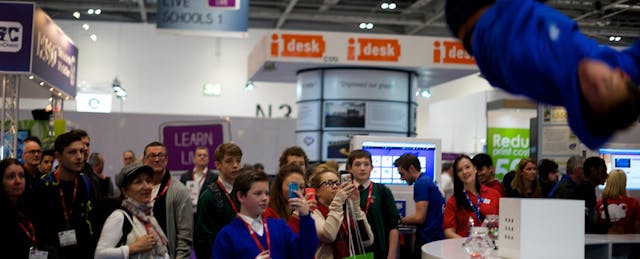America has FETC and ISTE; Europe has BETT, held just outside of London each January. With an estimated 40,000 visitors, legions of exhibitors and support staff, BETT is so significant that back in 2013 it even managed to tempt EdSurge CEO, Betsy Corcoran “across the pond.”
BETT is very different from FETC and ISTE, not just in terms of size but in its focus. The latter’s key audiences are educators whereas BETT is split 50:50 between being a trade show and an event for educators. But far more than an average trade show, BETT boasts hundreds of events, seminars and thought leaders that attract 20,000 educators over its four days.
For educators, highlights include a TeachMeet, an informal “unconference” similar to EdCamps that are popular in the US. Thirty-six teachers presented their ideas, and a TeachEat, where for £10 you got a some drinks and canapés. On the party side there is nothing on the scale of bacchanalian excess at SXSWedu, however.
The star-studded lineup of speakers include Wikipedia co-founder Jimmy Wales, the ever-charismatic Sir Ken Robinson and Jack Andraka, the American teenager behind groundbreaking research on cancer detection. Several talks were also led by students--something we don’t see enough of at edtech events. Joining them were corporate heavy hitters like Anthony Salcito (VP of education at Microsoft), John Phillips (managing director of worldwide education at Dell) and John Couch (Apple’s VP of education).
On the exhibition floor, the usual international suspects like Google, INTEL, Microsoft and Pearson made their presence unmissable with huge stands. But UK education companies had the vast majority of stands--and this investment must have represented a huge chunk of their annual marketing budget. One friend commented that he wanted to ask various exhibitors, “How the hell did you afford a stand of that size; I’ve seen your accounts!”
With over 700 booths, it’s easy to get lost, and BETT can be a sort of Bermuda Triangle for edtech startups. Fortunately, this year’s floorplan included a “Futures Zone” coordinated by the Education Foundation. Of the edtech startups I saw the ones I liked were:
- ZZish, which offers teachers a single dashboard that unifies data from different apps
- Bibblio, which links video content creators with customers and is recent graduate of the Emerge Education incubator;
- TinyTap and Sparkup, two startups that respectively offer learning games a book reader, that are part of the Israeli Tech Hub organized by MindCET
After three days wandering the length and breadth of BETT, here are my three takeaways:
- There’s too much focus on devices (numbers, types, etc) and not enough on the need for high quality content.
- Data: Who owns it, how can it improve learning and why do many companies still make data analysis so hard for educators?
- Many ‘new’ products were nothing more than repackaged versions of things schools already have, like new management information systems.


